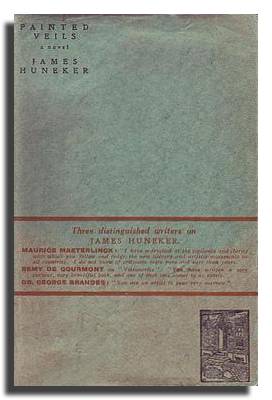Painted Veils
James Huneker

James Huneker’s Painted Veils, published in 1920, was indeed controversial for its time and includes lesbian content that was quite daring for the era.
The character who is lesbian-coded is Dora, who is portrayed as Easter’s “mannish” friend and companion. Dora is depicted as having masculine characteristics both physically and in her demeanor, fitting into period stereotypes of lesbian women. She’s possessive of Easter and shows jealousy toward Easter’s male suitors.
The novel presents their relationship with a mix of suggestion and more explicit commentary that was unusual for its era:
1. Dora is described as having an “unnatural attachment” to Easter
2. Their relationship includes physical intimacy that’s hinted at but not explicitly detailed
3. Other characters speculate about and comment on the nature of their relationship
4. The novel employs the medicalized language of the time that pathologized same-sex attraction
“Painted Veils” was considered quite scandalous when published, in part because of this content. The novel was actually banned in some places and difficult to obtain in the United States due to its frank treatment of sexuality, including the lesbian elements.
Huneker’s portrayal reflects the prejudices of his era, presenting lesbian desire as something “unnatural” or deviant. The novel is studied today as an example of early 20th century literary treatments of lesbian relationships, which were often portrayed through a lens of sensationalism rather than authentic representation.
—
From the author’s notes: This Parable, with its notations and evocations of naked nerves and soul-states, is inscribed in all gratitude to the charming morganatic ladies, les belles impures, who make pleasanter this vale of tears for virile men. What shall it profit a woman if she saves her soul, but loseth love? Now the seven deadly virtues are: Humility, Charity, Meekness, Temperance, Brotherly Love, Diligence and Chastity. And the Seven Deadly Arts are: Poetry, Music, Architecture, Painting, Sculpture, Drama and Dancing. The book begins: Until the day of her death Easter never forgot that first night in New York. It was the initial twist of her ship’s wheel, and the commonplace happenings which followed her entrance into the Maison Felice were to give force and direction to her entire life.
Click here for a list of Editions and Revisions
Check for it on:
Details
| Genre | Pulp |
| Copyright Date | 1920 |
| Publication Date | 1930 |
| Publisher | Werner Laurie |
| Format | Hardcover |
| Notes | A** rating in Grier |
| Language | English |
| Rating | Average |
| Subject | Lesbians – Fiction |
| BookID | 9557 |
